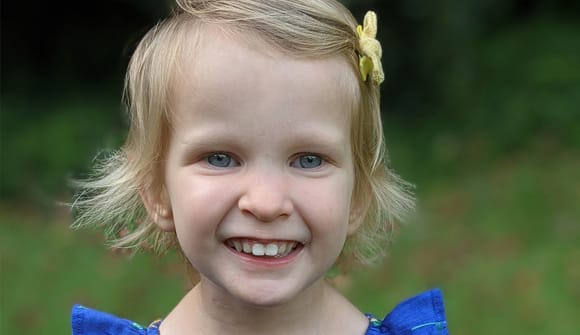Healing holes in the heart
Family's 'prayers answered' after girl undergoes surgery at Wolfson Children's.
Article Date:

She may be small, but Emerson Pullen has an enormous personality. The 3-year-old Tallahassee girl talks nonstop, loves to dress up, play with dolls and stuffed animals, and spend time in the kitchen helping her mother cook.
“I call her ‘Little Miss Chatterbox,’” said Halie Pullen, Emerson’s mom. “She is always full of energy, very determined and she knows what she wants.”
With such a vibrant personality, it’s hard to believe how much Emerson’s heart was struggling until she underwent surgery for a congenital heart condition at Wolfson Children’s Hospital of Jacksonville.
Emerson was born in July 2017 at Tallahassee Memorial HealthCare (TMH), where the medical team detected she had a heart murmur, indicating a possible heart defect or other underlying problem. The doctors consulted with Justin “Mac” Vining, MD, a board-certified pediatric cardiologist with TMH and Wolfson Children’s Specialty Center at Tallahassee Memorial HealthCare.
A hole in Emerson’s heart
At the hospital just two days after Emerson’s birth, Dr. Vining ordered cardiac testing, including a heart ultrasound called an echocardiogram. The tests revealed Emerson had a small hole between the two lower chambers of her heart, a condition known as a ventricular septal defect (VSD). Commonly called a “hole in the heart,” a VSD makes the heart work harder because the hole allows extra blood flow to the lungs. Large VSDs can sometimes cause slow weight gain in infants. When VSDs are large enough, they can lead to congestive heart failure.
But when VSD openings are small, they often close naturally as a baby’s heart grows, so Dr. Vining recommended an initial period of observation. After three years of monitoring, Dr. Vining detected the left side of Emerson’s heart had enlarged.
“Emerson's VSD appeared small from the echocardiogram, and she did not exhibit any signs of congestive heart failure on the exam, but she continued to have slow weight gain as she got older,” said Dr. Vining. “From a physiologic standpoint, she was experiencing a significant effect from her VSD that necessitated surgical closure.”
Prayers answered
Dr. Vining referred Emerson to Michael Shillingford, MD, chief of pediatric cardiothoracic surgery at Wolfson Children’s Hospital of Jacksonville.
“Our family had been praying for Emerson’s heart to heal on its own, but we were grateful to learn Dr. Shillingford would be performing her surgery,” Halie said. “My great-uncle is a retired surgeon, and he told us Dr. Shillingford would be the best if surgery was required. So that news in itself was an answer to our prayers.”
Halie and her husband, Jeff, scheduled a telephone consultation with Dr. Shillingford, who recommended an exploratory heart catheterization procedure at Wolfson Children’s Hospital, followed by open-heart surgery to close the hole in Emerson’s heart.
In August 2020, Robert English, MD, a pediatric interventional cardiologist with Wolfson Children’s and the University of Florida College of Medicine – Jacksonville, performed Emerson’s heart catheterization, inserting a thin, flexible tube (catheter) through a large vein in her leg and then guiding it up to her heart. During the procedure, Dr. English discovered a second hole in Emerson’s heart, determined to be an atrial septal defect (ASD), an opening in the tissue separating the heart’s upper chambers. He also found Emerson’s tricuspid valve was damaged and needed repair. The tricuspid valve helps keep blood flowing in the right direction through the heart. A damaged valve can lead to poor heart function.
“We were shocked to find out Emerson’s heart was in worse shape than we originally thought,” Halie said.
“In many cases, an ASD can be repaired during a cardiac catheterization procedure,” said Dr. Shillingford. “Because Emerson’s case was more complex, the cardiac cath was performed to provide a more thorough evaluation of her heart prior to surgery.”
Sick heart, healed
Five days later, Dr. Shillingford performed open-heart surgery at Wolfson Children’s to close both holes in Emerson’s heart and repair the tricuspid valve. Dr. Shillingford believes Emerson’s tricuspid valve leakage developed as a result of her body’s attempt to close the VSD on its own. Following the surgery, Emerson spent two days recovering in the Cardiovascular ICU (CVICU) at Wolfson Children’s before returning home to Tallahassee.
“We are very thankful our prayers were answered,” Halie said. “The medical team at Wolfson Children’s was amazing and they perfectly repaired my little girl’s heart.”
Emerson is doing well after surgery and has returned to pre-school and all of her normal activities. She continues to see Dr. Vining for follow-up appointments at Wolfson Children’s Specialty Center at Tallahassee Memorial HealthCare.
“Emerson's prognosis is excellent after surgical correction,” said Dr. Vining. “At her first follow-up appointment, I ordered an echocardiogram, and her heart’s enlargement had completely resolved and disappeared. She will require lifelong monitoring by a cardiologist, but I don’t expect Emerson to have any problems.”
To learn more about congenital heart defects and the pediatric heart services that are available for children and adults with CHD, visit wolfsonchildrens.com/LittleHearts.
The C. Herman and Mary Virginia Terry Heart Institute at Wolfson Children's Hospital provides expert treatment for children with a wide range of heart conditions. To learn more, call 904.202.8550.



